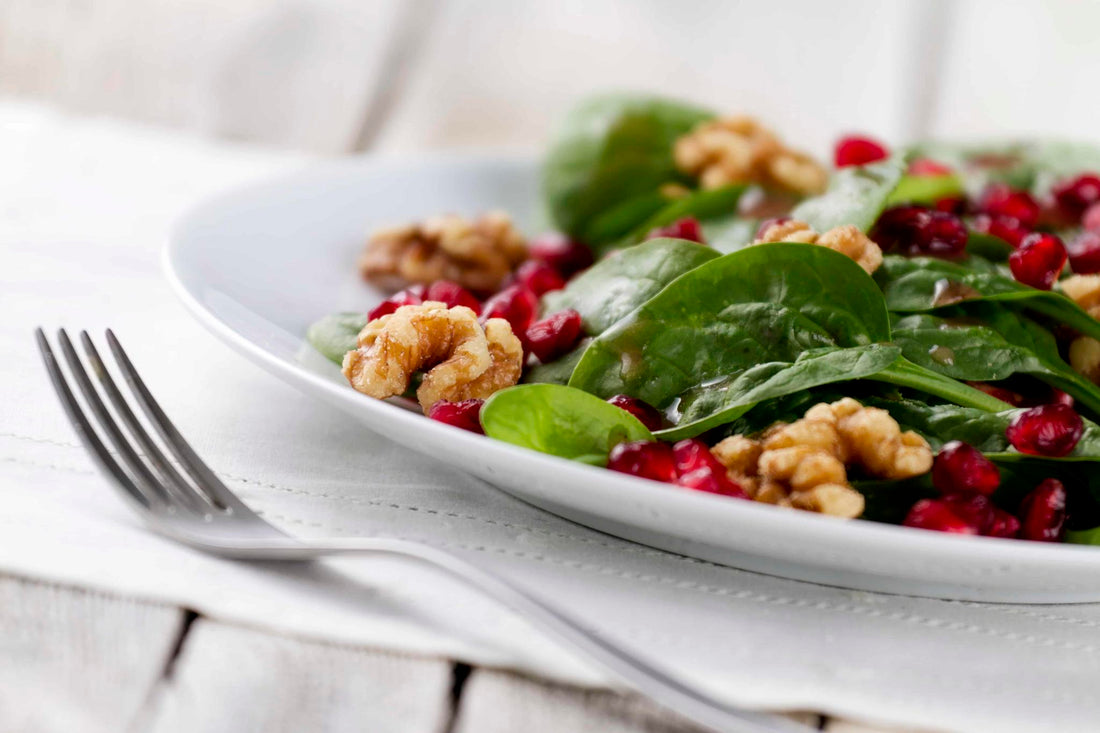Read Time: 3 min | Categories: Healthy Recipes
Quinoa Pomegranate Salad Recipe
Webber Naturals
Share this article
A Crunchy, Delicious Heart Healthy Recipe
This is a heart healthy vegetarian recipe with a nice crunch and a touch of sweetness – just what your heart desires!
Quinoa Pomegranate Salad
Serves 4
- 1 cup water
- ½ cup organic quinoa
- 2/3 cup pomegranate seeds (approx. half of a pomegranate)
- 1/3 cup coarsely chopped walnuts
- 1 handful of baby spinach
- 1 tbsp. olive or flax oil
- 1 tbsp. honey
- 1 tbsp fresh lemon juice
- ¼ tsp. cinnamon
- ¼ tsp. ground ginger
- 1/8 tsp. ground nutmeg
- 1-2 lemon slices (if desired)
- Add quinoa and water in a pot and bring to a boil. Turn heat to low, cover and cook for 15 minutes. Place in a medium sized salad bowl and let cool for 15 minutes, fluff with fork.
- In a small bowl or jar, mix together the oil, honey, fresh lemon juice, cinnamon, ground ginger, and nutmeg. Keep this aside until you’re ready to eat your salad.
- Mix together the cooled quinoa, pomegranate seeds, walnuts, and baby spinach.
- Drizzle the dressing over the salad and gently toss until well coated and serve.
Optional: Add a squeeze of lemon for more zing!
Lunchbox idea: A good ratio for a side dish at lunch is 1 cup of salad mixture to 1 tablespoon of the dressing. Keep each separate until ready to eat. Having a small sealable container is good to have for salad dressings and dips to take to work or school.
Delicious, and Healthy!
Quinoa is high in protein and fibre, gluten-free, and has a low GI rating. Quinoa contains B vitamins and vitamin E, strong antioxidants and phytonutrients that support the body’s natural inflammatory response.. It also has small amounts of heart healthy monounsaturated and polyunsaturated fats. Quinoa cooks quickly, is easily digested and a great alternative to rice and grains that contain gluten (wheat, spelt, Kamut, barley, rye, and triticale).
Pomegranates seeds are notably high in antioxidant vitamin C and potassium as well as many B-complex vitamins and vitamin K. They’re a rich source of polyphenols – plant chemicals that give fruits and vegetables their deep rich red, blue and purple colours. Consuming a wide variety of plant foods rich in polyphenols are thought to support the cardiovascular system because of their ability to lessen oxidative stress by scavenging for free radicals and contribute to other factors associated with cardiovascular health.[1] *
Walnuts are a good source of the essential fatty acid omega-3 alpha-linolenic acid. Many people lack sufficient dietary intake of omega-3 fatty acids, yet it is vital for normal growth and development, and the maintenance of good health. * Supplementation with Omega-3 fatty acids EPA and DHA from fish oils have shown to benefit cardiovascular healthy by maintaining serum triglyceride levels already within the normal rang and play a role in regulating normal inflammatory responses in the body.[2] *
